SALFORD IMPACT:
SHOWCASING THE LOCAL, NATIONAL, AND GLOBAL IMPACT OF OUR RESEARCH


SHOWCASING THE LOCAL, NATIONAL, AND GLOBAL IMPACT OF OUR RESEARCH

At Salford we embrace the need to build partnerships and collaborate to develop and deliver new knowledge and innovations. Impact from our research ranges from enhancing businesses’ products and services, through assisting policy makers in addressing major societal concerns, to sharing knowledge and expertise to benefit our community.
In 2021 we set out our new Innovation Strategy which identifies four cross-cutting themes representing areas in which our institution can collectively benefit society - Productivity, Sustainable Environments, Healthy Living, and Creative & Resilient Communities. This report is based around these four themes and highlights the impact we have already generated from our research across these areas.
Productivity remains a concern in the UK and requires innovative solutions that can improve efficiency, reduce waste, and promote growth. Our research is helping to develop the technologies of the future and training business leaders on how best to adopt these technologies to improve their processes.
In response to environmental concerns, sustainable practices such as reducing waste, conserving energy, and promoting renewable resources are growing. Our research is helping to develop eco-friendly activities to ensure we can all contribute in the drive towards net zero, as well as informing environmental standards and guidelines both in the UK and Internationally.
Healthy living is a multifaceted concept that encompasses physical, mental, and social wellbeing. Our research helps develop new diagnostics and treatments, promotes better public health and supports marginalised communities both at home and overseas.
Creativity and resilience are vital components of strong and thriving communities. Our research has demonstrated that by tapping into creative resources and developing innovative solutions, we can help communities face challenges ranging from natural disasters to economic hardship and social instability.
Our Innovation Strategy will see the University capitalise on our key areas of strength in research and enterprise, and to work in partnership to address the needs of local, regional, national and global stakeholders. This report showcases examples of our research impact and our work with partners, in the UK and beyond - we hope you enjoy reading it as much as we enjoyed creating the impact within it!
Professor Karl Dayson, Pro Vice-Chancellor Research and Enterprise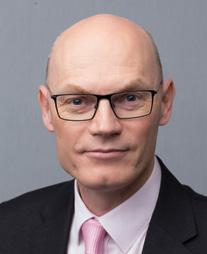

Over the last three years (2019-2020 – 2021-2022), we have engaged our partners via a number of different routes to deliver impact:
3,589
Consultancy contracts completed, of which 70% were SMEs 1
950+
Public and community events delivered, attracting over two million attendees
227 Contract research projects worth £5.4 million
51,877
Learner days of CPD training, working with 1,200 SMEs and 12,000 delegates annually
8
Spin-out companies launched based on Salford research, with two successfully exited
21 Software (8) and non-software (13) licences granted
23 Active patents in our current portfolio
30
Ongoing collaborative research projects at any one time
At the University of Salford working with businesses is in our DNA. We are able to help our external partners to find solutions to specific business problems through close relationships with the University’s research base. Through collaborative research and development, we work with a wide range of industries and organisations, from SMEs to global brands, and third sector. Our portfolio of collaborative projects mixes those geared towards wider public benefit with others focused more towards commercial impact.
In the 1970s we were the first university to pilot the Teaching Company Scheme, now known as Knowledge Transfer Partnerships. Initially set up by government to support the manufacturing and engineering sectors, the KTP scheme has been proven to work with companies in a wide range of sectors and sizes. Over the years, we have been involved in 275 KTP projects, with over 65% of those involving collaboration with an SME and 59% with partners in the North West.
KTPs often lead to further collaboration with the company partner as evidenced by our engagement with Farrat Isolevel Ltd. The success of our initial KTP in vibroacoustics has led to a further two KTPs and an industry-sponsored PhD project to investigate building physics.
Our PhD programmes are increasingly connected with external partners. Coinvestment in industry-sponsored projects provides candidates with valuable employment skills and provides our partners with added research capability. Since launching in 2014, 46 PhD students have been appointed to deliver IPhDs.
An IPhD set up between our sports strength and conditioning team and Hawkin Dynamics is providing validation of their force plate system for use in athletic performance testing. Testing has been carried out across a wide range of football and rugby teams (men’s, women’s, boys, and girls) across the North West and in Spain, including Premier League and La Liga football teams.
/ Based on research led by Professor Trevor Cox from the Acoustics Research Centre, investigating the acoustic behaviours of porous materials such as activated carbon. The properties discovered allow for smaller and light devices.

/ A successful application of the technology has been to improve the performance of air springs in vehicle suspensions. CarbonAir’s products have been used in Audi A6 and A6 Allroad cars.
/ A not-for-profit Community Interest Company created by Professor Caroline Davey and Andrew Wootton, which addresses student safety, security and wellbeing through a human centred design approach.
/ ProtectED has influenced policies and practices across the Higher Education sector, leading to improvements in student safety in many education institutions.

/ Salsa Sound audio, based on AI driven technologies and developed by Dr Ben Shirley and Dr Rob Oldfield of Salford’s Acoustics Research Centre, automates real-time sound-mix production for live broadcasts and creates realistic virtual crowd noise.

/ Salsa Sound audio has been broadcast to millions of sports fans worldwide across five different sports and has been used by the American TV network CBS Sports among others.
/ Based on research developed by Professor Ghasem Nasr and Dr Amir Nourian on ‘eco-valves’, an environmentally friendly aerosol valve that does not rely on volatile hydrocarbon propellants.
/ These valves reduce the costs of manufacturing, storing and transporting aerosol cans and are now being used by big name brands such as Nivea, Rossmann, and in Proctor and Gamble’s Native deodorant spray.
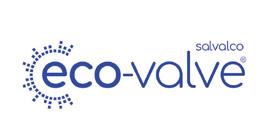

Our researchers are working at the forefront of technologies such as robotics, AI and immersive applications. Immersive technology and simulation is a growing area in which our researchers have developed a range of visualisation platforms for various clients. Oculus Rift technology has been used to produce an interactive virtual reality model of Siemens’ new Offshore Electrical Substation. The model created enables users to explore the substation in real time in order to undertake design and safety reviews.
Expertise in robotics and automation is being utilised within the new North of England Robotics Innovation Centre (NERIC) adding value to the University’s and Greater Manchester’s technical infrastructure. The £16 million facility serves as a hub for SMEs looking to design, test and validate innovation in this rapidly growing area. NERIC has worked with LOFT, a furniture provider, exploring with them how robotics and automation could add value to their business through the picking and dispatch process. LOFT now have a vision of which processes could be automated and a clear understanding of the requirements for integration.

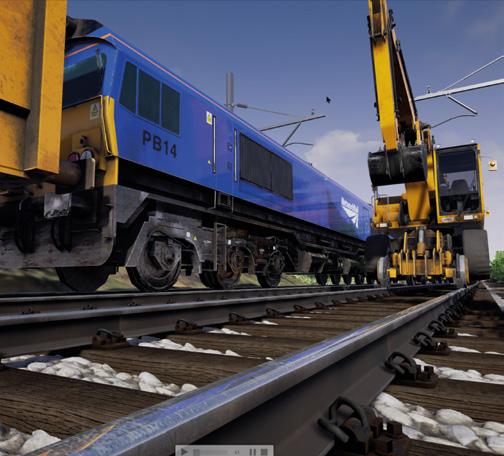
PROBLEM: Network Rail maintains much of the UK’s train tracks, with track renewal programmes needing to be carefully planned to avoid major service disruption.
SOLUTION: A team from the University’s THINKlab has developed a new simulation tool to help with modelling track renewal programmes. Unlike conventional modelling approaches, the planning and simulation aspects of the software work together, so that outcomes of the planning are represented immediately in the simulation.
OUTCOME: This 4D simulation tool helps Network Rail in the staging of their works, reducing the time and costs for track renewal. The project has also led to the technology being commercialised through a spin-out company, 4DSimulation.
Salford researchers have worked on questions related to managing the impact of digitalisation in work and society, how digitalisation can improve the productivity of SMEs and how the use of technology can empower workers in modern workplaces. Through a series of KTPs, Salford researchers have initiated digital transformation processes that deliver long-term positive organisational change, producing more innovative organisations and increasing their economic value.
/ Sigma Consulting Solutions - development of a new user experience methodology to introduce a values-driven approach to innovation and enable the company to become more ethical in its practices.
/ FastWeb Media - fundamental shift in the underlying business model through the development of a new digital campaign management tool, realising a new income stream and diversifying the risks of operating as a service company.
/ Tameside Metropolitan Borough Council - a new progressive policy and empty home service was adopted to engage with empty homeowners to bring the homes back into use. This led to 70 houses in Tameside being returned back to use and 541 homes in the Greater Manchester region.
/ Avoira (previously Pennine Telecom) - transformation of digital cross-channel marketing techniques resulting in group sales rising over 30%, helping to secure a merger with NycommGroup.
PROBLEM: In a digital era, hard-copy documents can contain valuable, yet inaccessible data and images and they also run the risk of being damaged or lost.

SOLUTION: Research by the Pattern Recognition and Image Analysis (PRImA) Laboratory, headed by Professor Apostolos Antonacopoulos, has developed new innovative methodologies and software to improve the digitisation of hard-copy documents including the licensed software Aletheia.
OUTCOME: These methodologies have been used by the Office for National Statistics (ONS) to recover large numbers of microfilmed computer printouts. Collections of rare materials at the British Library have also been digitised using the Aletheia software. PRImA’s software solutions and methodologies have also been used in digitisation projects by the Wellcome Collection, the Berlin State Library, and the National Libraries of the Netherlands and Finland.
DIGITISATION
In the last three years, over 300 SMEs have been supported through a series of business innovation initiatives, part-funded by the European Regional Development Fund (ERDF). These initiatives have helped to drive meaningful improvements in productivity for local SMEs, which in turn creates aspirations for further growth and development in the region. A wide range of business sectors have taken part in the schemes including manufacturing, digital and creative media, advanced materials, and health innovation.
/ Collaboration between Salford, Manchester, Lancaster and Manchester Metropolitan universities to support SMEs from the Greater Manchester area.
/ Focused on protecting operations and assets for SMEs and strengthening their cyber defences, enabling new products to be brought to the market, along with upgrading the user experience.
/ A second collaboration between Salford, Manchester, Lancaster and Manchester Metropolitan universities to support SMEs to innovate and grow their business.
/ Focused on embedding Artificial Intelligence capabilities to increase efficiency, improve performance and secure a competitive edge in the digital era.
/ Opened in 2022, NERIC is a £16 million facility specialising in automation and robotics, alongside other innovative digital technologies.
/ Local SMEs have access to specialist equipment and innovation services that support new and improved applications and products to be taken forward.
/ Government-funded management programme to help SMEs take their business to the next level, delivered by Salford Business School and accredited by the Small Business Charter.
/ The programme supports businesses in developing strategic skills, such as financial management, innovation and digital adoption.
/ Attended by businesses from over 40 different sectors across the North West and beyond.
In addition to these business innovation programmes for external SMEs, Salford Business School supports Launch@Salford a purpose-built incubation space for students and alumni to unlock the potential of their business idea. Launch@Salford offers business basics training and mentoring in partnerships with The Growth Company’s Business Growth Hub. Since its inception in 2018, Launch@Salford has supported 188 students to start their own business, awarding over £275,000 in funding.
Salford Business School is working with the community group Leigh Means Business to raise the profile of Leigh and improve the image of the town centre, increasing visitor numbers, improving the local economy, and reducing antisocial behaviour. This partnership enables Leigh Means Business to broaden and deepen their business development offer to the businesses of Leigh, with projects also providing opportunities for Salford’s students to put their learning into action working alongside business owners.
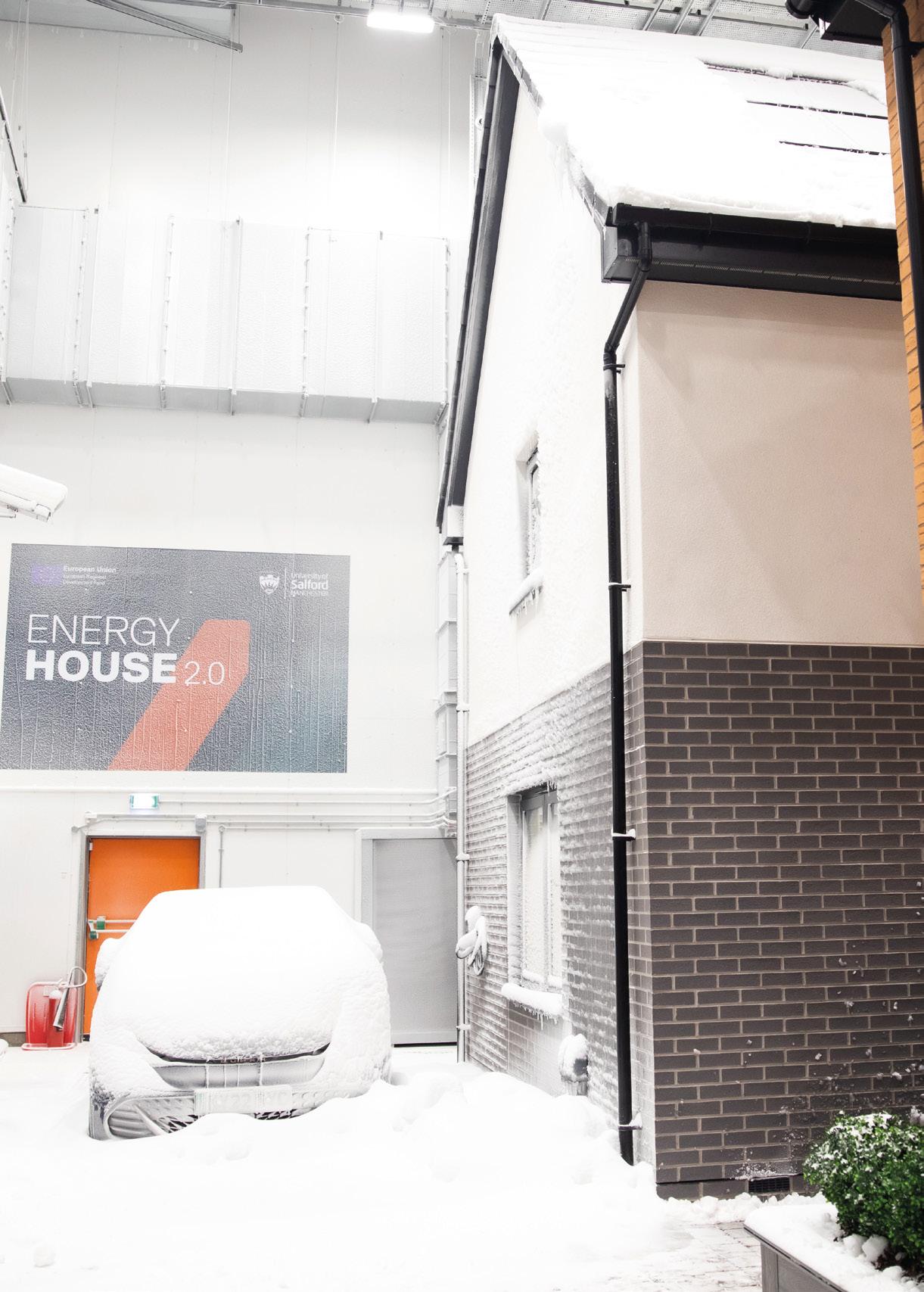
With the built environment accounting for 40% of the UK’s carbon footprint, our Energy House Laboratories support the development of innovative products that can make homes more eco-friendly, energy efficient and well insulated. The research and testing facilities enable the assessment of both retrofit technologies and new build solutions for the future, including low carbon and net zero housing design.
Over20 energy saving products tested
£100m in business revenues
200 new jobs created
35m tons of CO2 savings
The original Energy House, built in 2011, is also an important facility in informing policies and guidance in the UK and beyond. Studies carried out in partnership with the British Electrotechnical Manufacturer’s Alliance saw significant cost efficiencies through the use of room thermostats and thermostatic radiator valves, leading to changes in the EU Energy Performance of Buildings Directive, and more locally in the Sustainable Urban Development Strategy for Greater Manchester. Retrofit projects with Saint-Gobain have demonstrated the importance of whole house retrofitting, discovering that the heating demands of houses could be reduced by 63%. Our research has also been used in the UK Government campaign ‘It All Adds Up’ which recommended that reducing boiler temperatures from 75°C to 60°C could save around £100 annually, without reducing the temperature of the home.
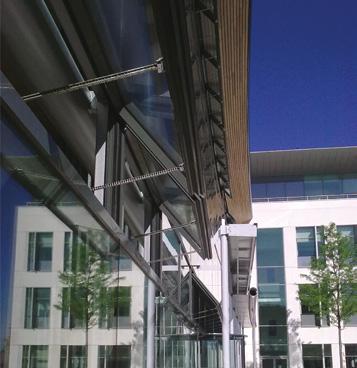
At a cost of £16 million, Energy House 2.0 is the largest research and test facility of its kind in the world. The Laboratories incorporate two environment chambers each able to accommodate two detached houses and recreate a wide variety of weather conditions with temperatures between -20°C and +40°C, together with wind, rain, snow and solar radiation. Energy House 2.0 won the PraxisAuril Knowledge Exchange Award for Net Zero Project of the Year in 2022.
PROBLEM: Dyer Environmental specialise in ventilation systems and wanted to expand from a ‘supply and installation’ company to start developing their own innovative products and systems.

SOLUTION: A team led by Professor Nigel Mellors provided expertise and technological support to Dyer, leading to a new product development process. This resulted in the creation of a new environmentally friendly ventilation product – SOLIS.
OUTCOME: The successful launch of SOLIS resulted in an investment of £500,000 into Dyer from the German manufacturing company D+H Mechatronic for the manufacturing rights. Dyer has now become a close partner of the University, funding an IPhD as well as continuing to grow their R&D capabilities with the help of Salford academics.
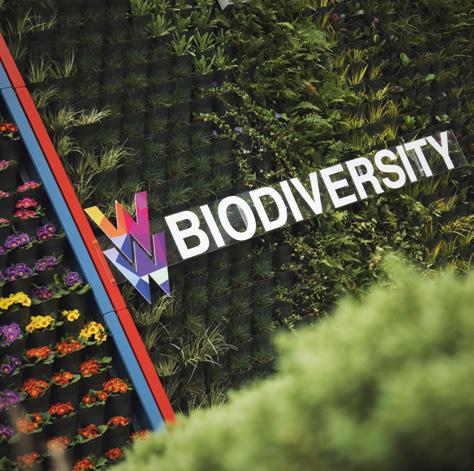
Water pollution, flooding, droughts, and poor agricultural practices are causing damage to ecosystems and posing challenges to food security and human welfare. Through our research, we have found that using constructed wetlands that mimic natural environments can help transform vulnerable landscapes into sustainable and resilient environments. Collaborating with partners such as DEFRA and the Environment Agency, our research has had a significant impact on wetland-related systems. The findings have been incorporated into national and international guidelines on wetland system management and have informed best practice in designing and maintaining flood storage reservoirs. Implementing these findings has resulted in reduced flooding events, improved water quality, and an increase in visitors to local wetlands. Grey water recycling is a popular water conservation method that reduces the strain on water resources. Through an IPhD in partnership with United Utilities and Arvia Technology Ltd, Salford researchers have developed a new grey water recycling system that not only recycles water but also recovers its thermal energy using Arvia’s patented treatment technology. A pilot system was installed at the University’s Energy House to study heat recovery and ease of retrofitting. The results showed that the project was feasible and the product could be a significant player in the grey water recycling market.

PROBLEM: Carbon reduction is a global challenge. Greater Manchester Combined Authority and the University have a goal to be carbon neutral by 2038.
SOLUTION: We partnered with other organisations across the city-region in the €4.6 million EU-funded IGNITION Project to establish innovative solutions to promote wide scale implementation of green infrastructure. Our on-campus Living Laboratory is directed by Professor Hisham Elkadi.
OUTCOME: Our Nature-Based Solutions Living Lab is a live test facility that showcases viable and innovative green technologies in real time, such as green roofs, a living wall, SUDS trees and rain garden. Evidence gathered from the Living Lab has shaped future projects and has led to the deployment of more than 40 nature-based solutions across Greater Manchester.
For more than 15 years, Professor Mike Wood’s ecological research at Salford has contributed to environmental decision-making, management, and policy development regarding environmental radioactivity and its effects on wildlife. The research has been incorporated into ERICA2, the world’s most widely used environmental radiological assessment tool, which enables over 40 countries (including the top six nuclear power-producing nations) to demonstrate compliance with radiological protection standards. Salford research has significantly improved the estimation of radiation doses to wildlife, including a new assessment capacity for reptiles. The research has also led to the creation of a safety standard for the United Nations’ International Atomic Energy Agency and significantly reduced uncertainty in wildlife dose assessment.
The ERICA tool is also used by industry to inform business decisions. Magnox Ltd used the tool to safely decommission 12 nuclear sites and to demonstrate safe in-situ disposal, impacting minimally on surrounding ecosystems. In the UK, 25 Environment Agency regulators have been trained to apply Salford’s science within their regulatory function, leading to increased resilience and reduced risk to business.
PROBLEM: Globally, many primate species are under threat of extinction.
SOLUTION: A team from the University, led by Professor Jean Boubli, were involved in a global study to sequence the genomes of more than 200 primate species, creating the first ever global catalogue of primate genetic diversity. The Salford team used information from the fossil record in combination with the genome sequences to produce a high-quality primate family tree.

OUTCOME: Published in the journal Science, the data opens up a new era in primate research, creating an accurate picture of how all the different branches are related to each other. This is a game changer in studying many aspects of primate evolution as the research shows how primates have evolved over the last 60 million years. With many primate species under threat, the research will help with future conservation efforts, in the Amazon and more widely.
Our Morson Maker Space and Environmental Sustainability teams have worked with the Peel Park Ranger to develop the Peel Park Tree Trail. The trail includes 25 trees and helps the local community to learn and appreciate the variety of species of trees in our local area. Each tree on the trail has a plaque made in the Maker Space with its name, Latin name, and an illustration of the tree leaf. Following this work, the teams have been approached to carry out further work to create a tree trail for Ordsall Park.
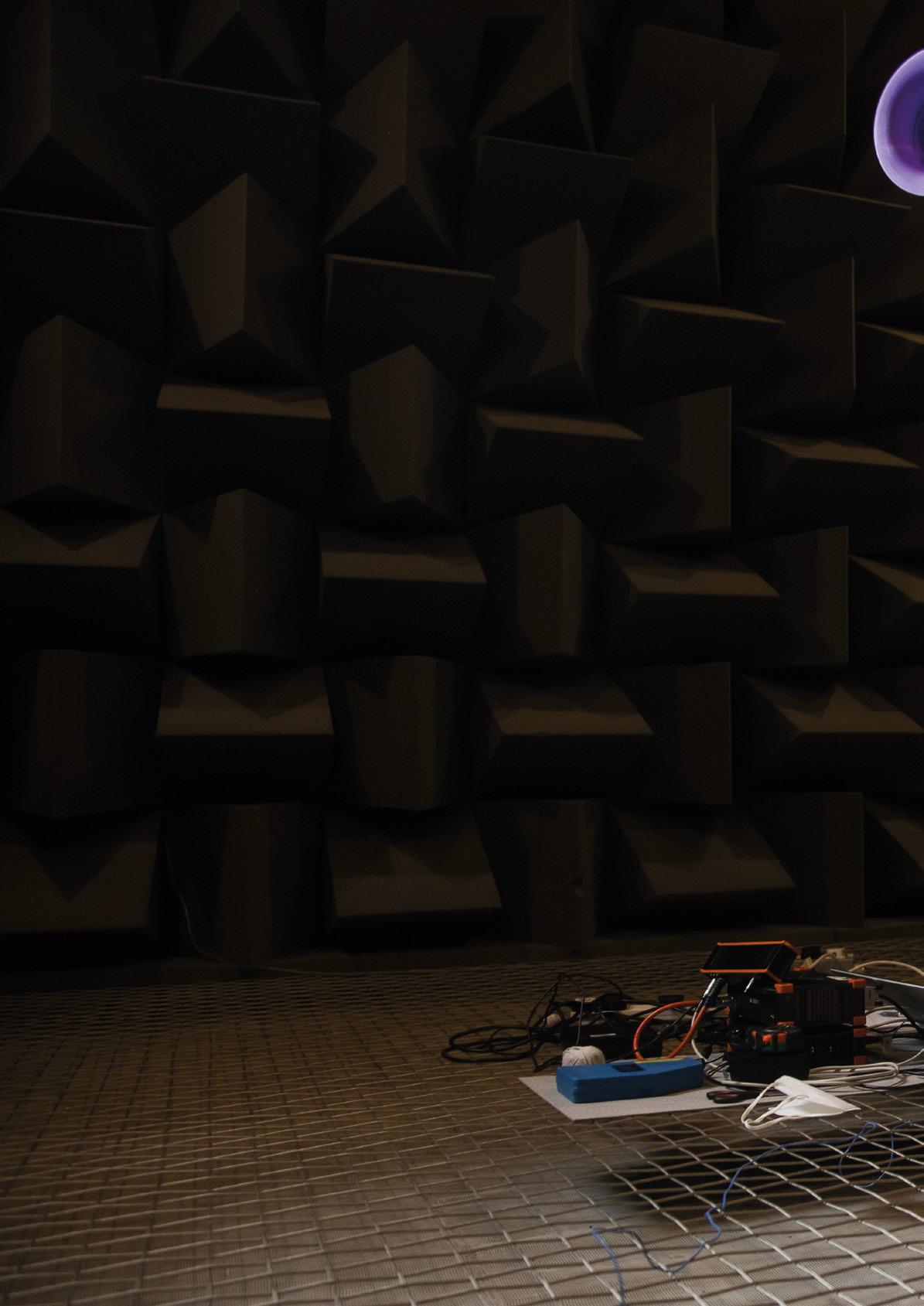
Acoustics is ubiquitous in the world, as sound is everywhere. There are many acoustics-related problems we face, whether related to environmental noise or not being able to hear speech properly when you have hearing loss. The human is very much at the centre of our acoustics research as, at its core, it comes down to how humans respond to sound and how we make things sound better.
Acoustics and audio research has been conducted at the University of Salford for 60 years. Our world-class acoustics laboratories allow us to address research problems regarding poor acoustics, environmental noise and building acoustics leading to an extensive set of industry partners and collaborations. Our research feeds into products manufactured and sold worldwide, as well as regulations and standards used in the UK, Europe and internationally. The research centre is also one of the founding partners of the BBC Audio Research Partnership. Some examples of recent projects include developing a warning sound for Dott e-Scooters so that pedestrians get more warning when a scooter is approaching them; carrying out acoustics testing in many of the new buildings being built across Manchester; working with Rhino Doors on sound insulation strategies for doors supplied to Crossrail. Our research on acoustics measurement has led to two international standards:
ISO 17497-2
/ Covers the sound-scattering properties of surfaces such as room diffusers.
/ Led to new diffuser designs being installed worldwide, including high-profile constructions for The Academy Museum of Motion Pictures, Apple, Google and Facebook.
/ Covers the characterisation of sources of structureborne sound and vibration.
ISO 20270
/ Used by many engineering companies whose products create noise that shapes the built environment soundscape, including Alstom, Bentley, Dyson, Volvo, General Motors and Scania.
We host the new National Institute of Airbourne Acoustic Metrology, part of the UK National Measurement System delivered through the Department for Science, Innovation and Technology. This institute allows us to expand our airborne acoustics research and offer a service to industry that represents the highest level of calibration for UK acoustics.
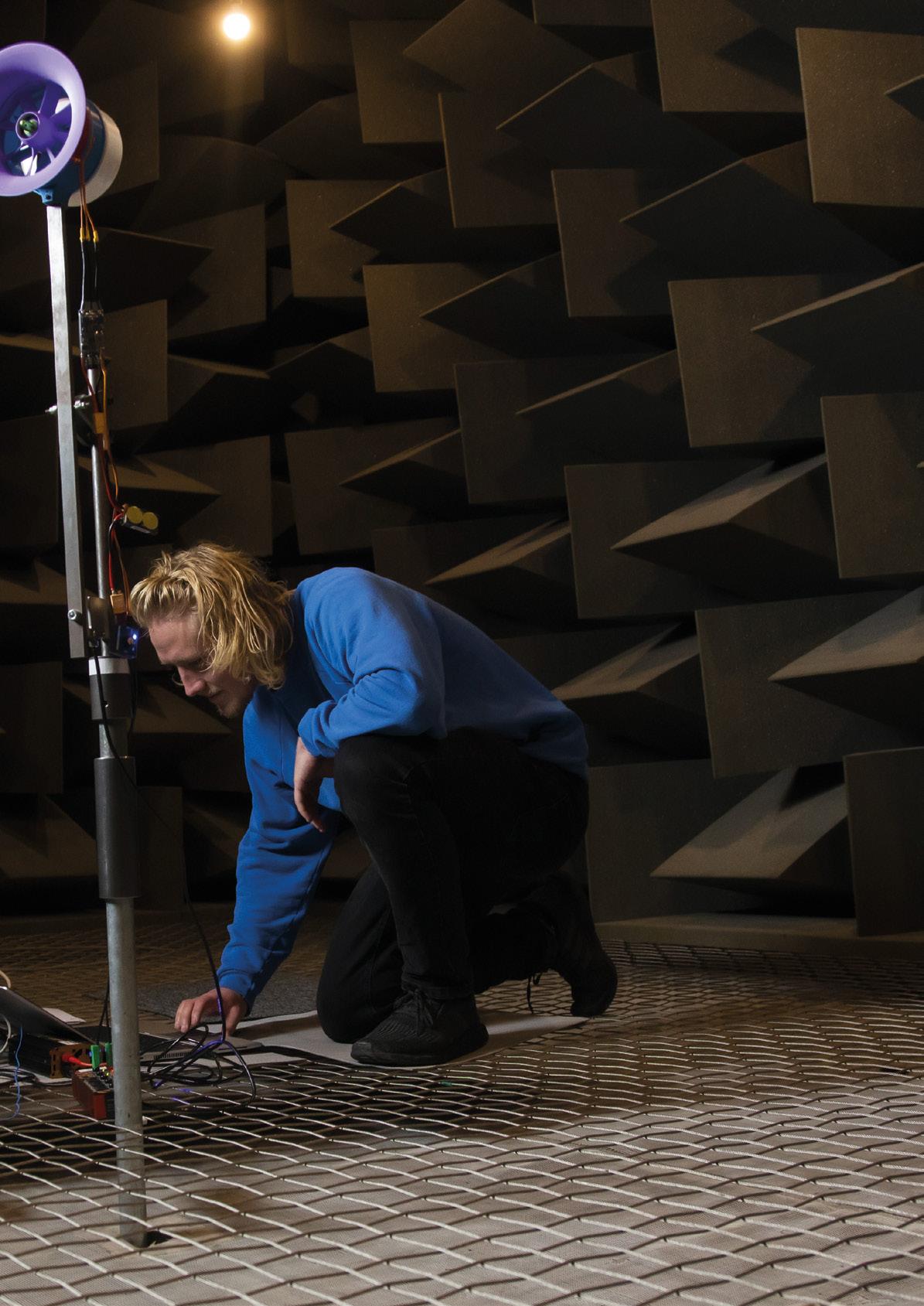
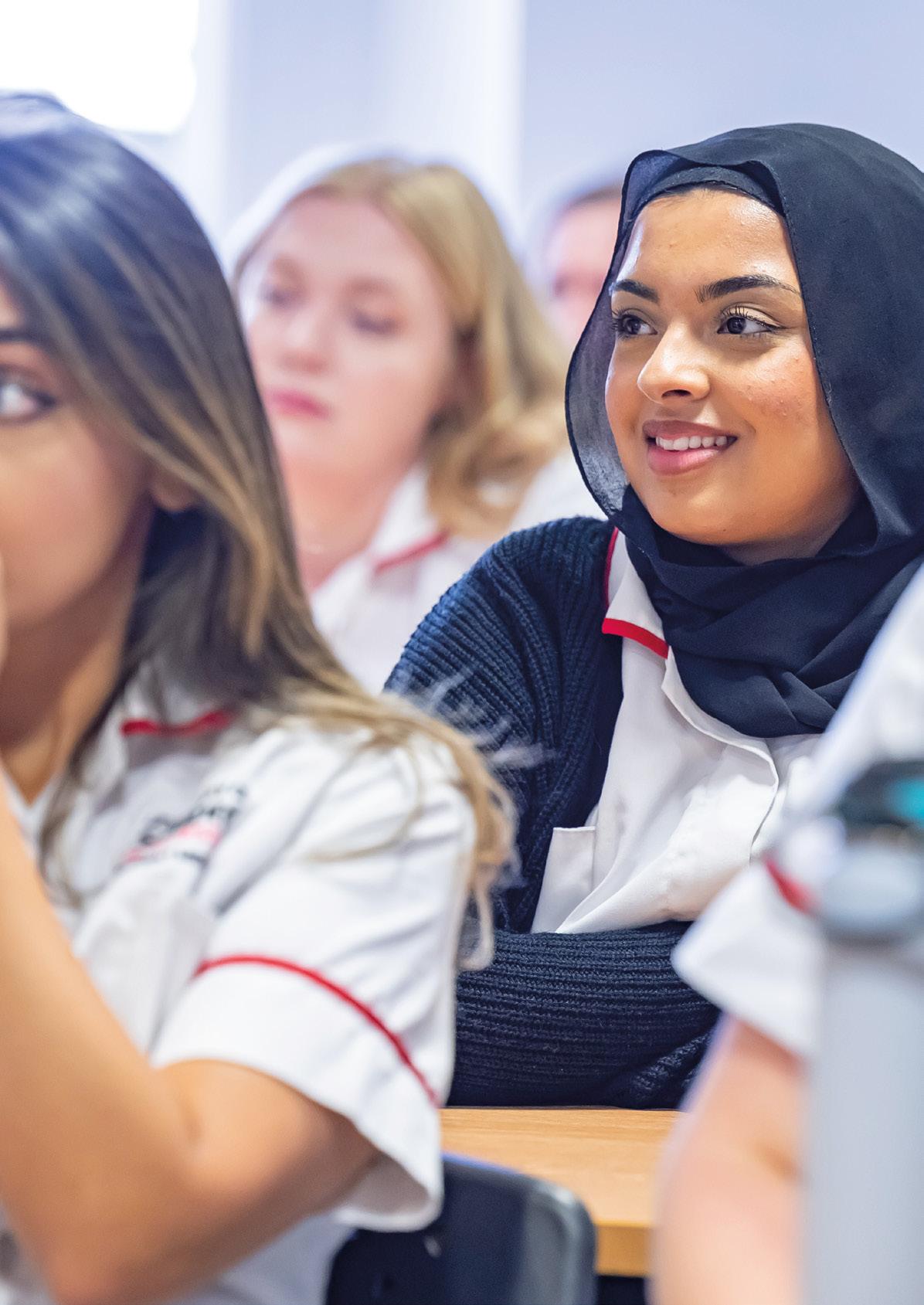
Our Centre for Human Movement and Rehabilitation is an area of research excellence at Salford. The centre’s research addresses many important health challenges that limit mobility, are associated with pain, and which can prevent people living independently. The team’s research has led to new clinical standards and treatment guidelines across a variety of fields, leading to better treatment outcomes, as well as developing new footwear offering increased comfort.
/ Research on mobility provided the first major update to the clinical gait model and methods for over 40 years, transforming the quality of data and measurement standards globally. This new model has been adopted by Vicon and Qualysis, who supply software to 80% of clinical gait laboratories globally.
/ Our researchers designed, developed and tested a suite of arthritis-specific clinical assessments to unravel the myriad of ways in which this condition can affect individuals so that tailored selfmanagement strategies could be devised. Findings have been utilised to inform treatment policy, guidelines and clinical practice changes within the NHS.
/ Research on foot health has attracted innovative companies looking to develop their footwear, such as Clark’s, Scholl and WearerTech. In addition, a range of orthotics for various conditions have been commercialised via Salford Insoles.
Our Medical Imaging Research Group developed and published new standards and techniques for mammography that improve image quality, which are now embedded within the UK’s breast services who screen around 2 million women per year. In addition, screening providers outside of the UK have updated their practices and policy in relation to mammography screening.
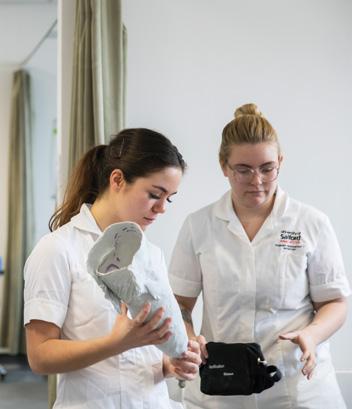
PROBLEM: There is currently a global skills gap within the field of prosthetics and orthotics, leading to a lack of access to appropriate services and devices.
SOLUTION: Professors Malcolm Granat and Laurence Kenney lead the UK’s only CDT focused on prosthetics and orthotics, working in conjunction with Imperial College London, the University of Southampton and the University of Strathclyde. The CDT is training the next generation of researchers in wideranging multidisciplinary research.
OUTCOME: Working with 27 external partners, including major prosthetics and orthotics manufacturers and healthcare providers, the CDT research students have been immersed in real-world academic, industry and clinical experiences, working directly with users and future employers from the outset. The first of the 58 PhD researchers who will be trained through the CDT graduate in 2023.
Salford provides various professional development opportunities to support the training needs of healthcare professionals, especially across the Northern Care Alliance. We focus on real-world applications, using advanced simulation suites and health imaging facilities (supported by GE Healthcare). We co-create bespoke training courses with our partners to address their workforce skills requirements. Together with World Wide Radiology, we developed a course in point-of-care ultrasound to supplement traditional examination techniques for acutely unwell adult patients in resource-poor settings. This gives clinicians a more affordable approach to bedside ultrasound as a diagnostic tool in emergency care, basic obstetrics, and infectious diseases. We also work with the World Health Organisation and Health Education England to provide a global programme that builds health workforce leadership capability and capacity in Low and Middle Income Countries (LMICs).
The University hosts a series of clinics that are open to the public, covering Podiatry, Running Performance (in association with the Manchester Institute of Health and Performance), Sports Injuries and Counselling and Psychotherapy. These are staffed by undergraduate students, under the supervision of fully trained clinical staff, and offer our students invaluable hands-on experience as part of their studies, provide participants for our innovative research programmes, and enable patients in our community access to healthcare services on their doorstep.
PROBLEM: Nurses today face rising digital challenges for both study and practice.


SOLUTION: The Salford Digital Skills Passport (DiSK Pass) was developed by Dr Cristina Vasilica and colleagues. It was designed and implemented as a novel solution to equip Health and Society students with the digital capabilities they need to be successful and make them more able to adapt to future technological developments.
OUTCOME: DiSK Pass has been designed to meet the criteria for the Future Nurse Standards for Proficiency and Health Education England’s Digital Capabilities Framework. The team is also exploring the digital readiness of registered nurses across the Northern Care Alliance, so that they can adapt DiSK Pass for nursing staff workforce development, to make this training more widely available.
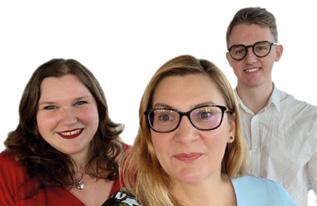
Salford researchers, working in partnership with a UK registered charity, Knowledge for Change, have established connections in Uganda to help improve standards of public health through a mixture of policy changes and best practice. The Ethical Educational Placement model, a ‘No Harm’ approach to undergraduate placements, has helped to sustain systems change in Ugandan healthcare settings, while allowing placement students to gain experience in different settings. A testing and sequencing facility was established in Northern Uganda, to help control the spread of SARS-CoV-2, sharing knowledge and experience gained in UK Covid-19 labs with Ugandan microbiologists to build capacity and accelerate reliable testing.
In the first study of its kind in the UK, researchers at the University found that Fetal Alcohol Spectrum Disorder (FASD) is a significant issue among the population, likely to be as common as autism, despite being rarely diagnosed. Commissioned by the Greater Manchester Health and Social Care Partnership, the researchers found that 1.8% of children taking part in the study had FASD, a disorder caused by the mother drinking alcohol during pregnancy. As a result, the partnership has provided guidance and support for expectant mothers and new training for maternity staff to raise awareness of the significant harm drinking can cause during pregnancy.
Responding to the changing ways that people access health information, we have developed digital platforms for healthcare support. Using a multidisciplinary approach between health and digital research teams, two new digital interventions have been developed:
/ Facemums is a professionally moderated social media platform available across England. It provides online accurate, timely and professionally-informed information, as well as connecting pregnant women together in a supportive and safe environment.
/ The Kidney Information Network initiates positive social change within the local community of renal patients, who struggle with isolation and access to real life information such as coping mechanisms, expectations and symptoms.
PROBLEM: Antimicrobial resistance (AMR) is a major global challenge, felt most acutely in Low- and MiddleIncome Countries.
SOLUTION: Salford’s unique multi-disciplinary approach, led by Professor Louise Ackers, demonstrated how holistic systems change could be applied to tackle AMR in LMICs such as Uganda. Our researchers worked with local staff to implement back-to-basics wound care.
OUTCOME: Sustained improvements in antimicrobial stewardship amongst health workers in Uganda, changing behaviour related to infection prevention and control, wound management, antibiotic use, and rational prescribing. Training for midwives led to an increased rate of wound swabbing post C-section, resulting in reduced deaths associated with maternal sepsis, a major cause of maternal mortality in Uganda. Although the research had a local focus, the findings were used to adopt policy at the national level in Uganda. Salford’s Tissue Viability team won the Wounds UK Award for Innovation Excellence in 2022 for their work in this area.
In the summer of 2022, University of Salford scientists exhibited at the Royal Society Summer Science Exhibition, showcasing their research on bacteriophages, which are viruses that infect bacteria. The team used a range of molecular approaches to find out how these viruses act to control the way that bacteria behave in lung infections. Working with immersive artists, the team created ‘VR-AIRWAYS’ an immersive journey through a diseased lung. They also partnered with the University’s Morson Maker Space, to create giant interactive models for the exhibition. The Royal Society exhibition was followed up with a mixed media exhibition as part of Lightwaves at MediaCity.
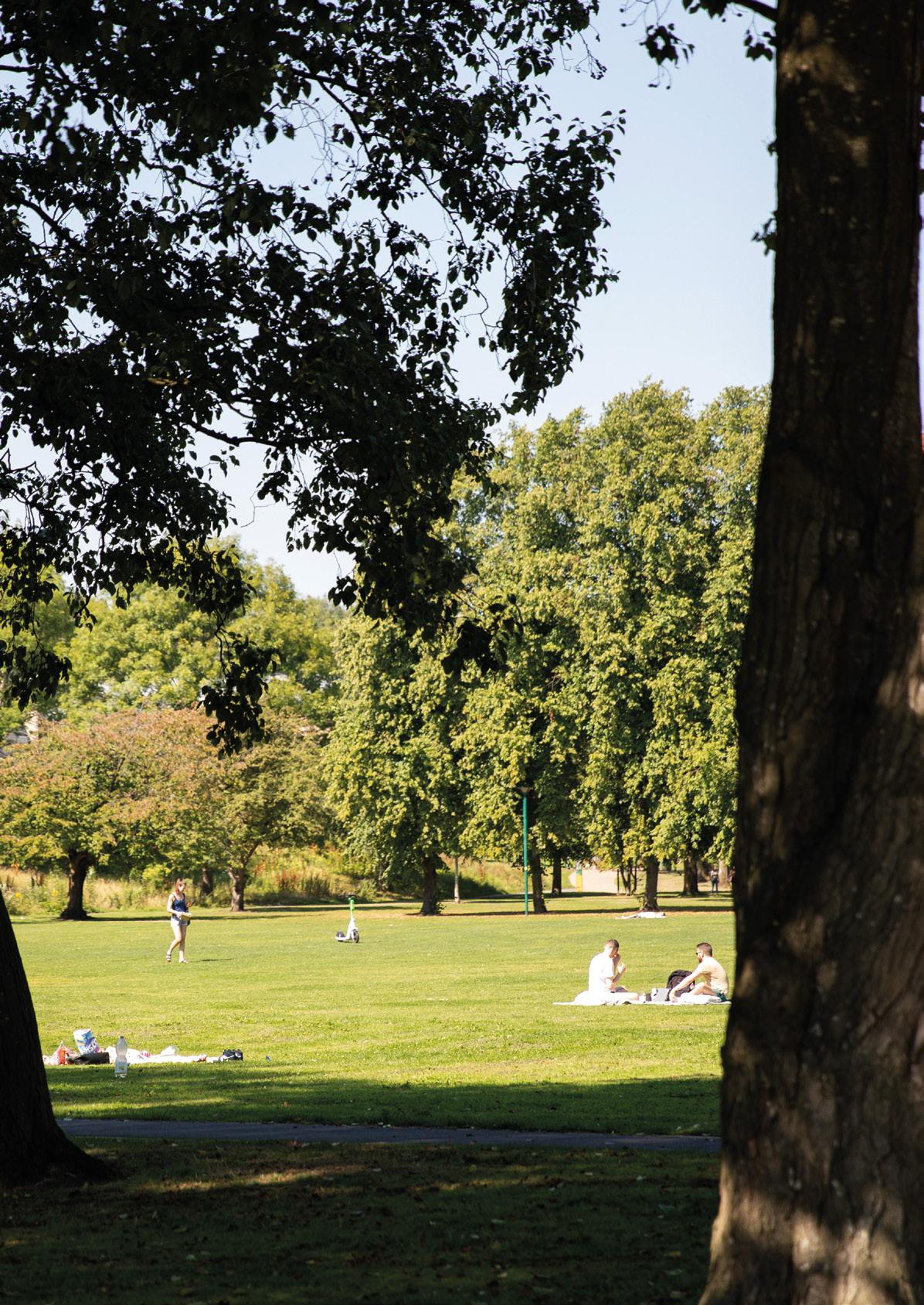
Several projects have been conducted across the University that intersect creative practice with nature, leading to benefits for our local communities. These projects include:
/ Exploring the conservation and scarcity of water, through public performance and film-screenings.
/ The use of creative writing techniques with the Loaves and Fishes charity in Peel Park, resulting in the graphic novel ‘Our Park’, with contributions from vulnerable people supported by the charity.
/ Exploring the intersections of mycology and creative practice, including performance and workshops with children and young people.
/ Revealing urban nature through creative walking. The ‘Wilding the Smart City’ project has resulted in two ‘sound walks’ in Manchester, available to download and experience.
/ Using contemporary visual arts to explore the unique post-industrial sites of Cornish Mining World Heritage, and as a different way of telling their story, utilising insights and knowledge gained to develop exhibitions and creative public engagement events.
Creative writing methodologies used to develop inclusive 3D printing practices have opened new routes of employment and life satisfaction for disabled users. 100 disabled people attended 3D printing workshops at our Morson Maker Space, encouraging personal agency and creativity, and leading to greater awareness of fabrication technology. Follow-on research looked at how these new skillsets could connect disabled people with the needs of employers, leading to collaboration with the Greater Manchester Chamber of Commerce and the charity Digital Advantage.
PROBLEM: Salford is home to MediaCity, an innovation ecosystem from which over 250 media and digital businesses operate. Training is needed to develop the existing and future workforce within these industries.
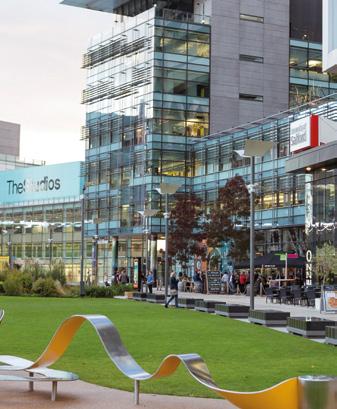
SOLUTION: The Pipeline is the University of Salford’s industry-led training facility established at MediaCity, headed up by Creative Director Christine Pike. Our investment at MediaCity covers a range of activities in support of local industry and encourages collaboration between students, technicians, academics and the media production industry.
OUTCOME: Our ScreenSkills CPD programme has trained 140 participants over the last 18 months across a variety of commissioned training courses including Animation and Production Management.
The University is an original member of the Salford Culture and Place Partnership, launched in 2019. The partnership now has 12 members representing the public, private, third, educational and creative sectors who work together to deliver innovative creative place-making programmes. Events such as the free ‘We Invented the Weekend’ festival have bought the Salford community together through a range of culture-led activities.
Supporting children leaving custody is a chronic issue in England and Wales. Salford’s research on the resettlement of youth offenders has been used to develop a new national policy approach to resettlement, including standards for Youth Offending Teams and custodial institutions, the Youth Custody Service’s new theory of change, inspection criteria, and curriculum for training youth justice staff to support resettlement. The approach has resulted in better wellbeing for children upon entering custody and has ensured that support is available before release.
Research focused on the impact of UK social security reforms on marginalised groups (including military veterans, migrants and disabled people) has resulted in changes in policy and practice, including:
/ The Department for Work and Pensions introducing a benefit sanctions early warning pilot as well as changing the way members of the Armed Forces Community are supported when accessing the benefits system.
/ The Work and Pensions Committee endorsing recommendations for disabled people to be exempt from certain sanctions.
/ Changes to Universal Credit to reduce the waiting period of first payments from six plus weeks to five weeks and increased advance payments for new claimants.
The University’s Design Against Crime Solution Centre uses innovative design thinking to develop models, methods and solutions for improving crime prevention and community safety. Their EU-funded Cutting Crime Impact project involved working with six police forces across Europe to develop innovative ways to fight crime. A series of toolkits were developed and subsequently demonstrated in an operational setting to assess their performance. Materials were also developed to support integration into law enforcement agency operations and foster wider implementation. Additional EU funding has allowed the Centre to collaborate with more partners around Europe to further integrate social and technological innovations to tackle urban security.
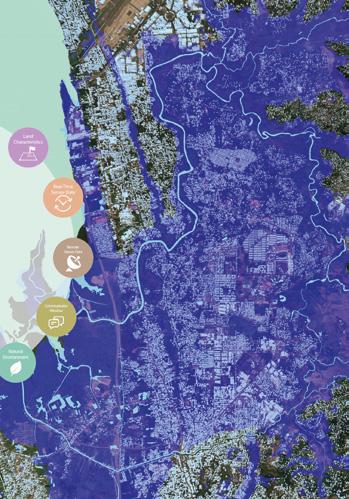
PROBLEM: Sri Lanka is highly vulnerable to natural disasters resulting from climate change, such as flooding and landslides.
SOLUTION: Professor Terrence Fernando and his team have developed MOBILISE, an advanced technology platform which brings together previously disconnected data on vulnerability, hazard prediction and exposure to enable collective decision making on disaster responses and disaster risk reduction.
OUTCOME: The platform has been used in Sri Lanka, where landslide early warning messages have reached over half of the national population. Over 50,000 families have directly benefited from improved flood warnings in one district of Sri Lanka. The World Bank has cited the MOBILISE platform as a key contributor to effective disaster management, increasing the capabilities of the Sri Lankan Government to prepare for disasters and to resettle affected communities elsewhere, while handling the concerns of host communities.
Urban agriculture can transform cities by promoting social interactions, economic activity, and environmental change. The interdisciplinary Salford Care and Urban Farm Hub is working with stakeholders exploring urban agriculture and care farming. Our research in this area has influenced the UK government to invest £10.5 million in local authority schemes and increase urban agriculture levels. The research also supported policy developments such as food charters, a national code of practice for care and urban farming, and the use of social prescribing. The Northern Roots Scheme in Oldham, shaped by Salford’s research, has led to significant changes in the town addressing deprivation, social isolation, and enhancing eco-tourism. The scheme created 80 jobs, 40 new businesses, and 45 social enterprises across Oldham. In addition, around 300 people per year are prescribed the scheme leading to positive impacts on mental health and wellbeing.
The University developed further alternative therapies for those struggling with mental health problems and social isolation. Examples include:
/ Arts for the Blues is a pioneering collaboration between artists, therapists, and researchers which explored alternative ways of treating depression, combining psychotherapy with creative practices such as dance, speech, writing and the visual arts. It has provided mental health sufferers with new learning skills and helped them develop relationships.
/ The University has worked with Salford Primary Care Together and RHS Bridgewater to allow local residents with mental health problems to help look after the gardens of RHS Bridgewater, as well as engage in crafts, nature watching and relaxation exercises. Participants have found the experience complementary to traditional therapeutic interventions, with many returning as part of a ‘Friday Club’ due to the benefits of the programme.
Salford researchers have used innovative methods to engage new audiences in classical music. Northern Voices, funded by Arts Council England, developed singing techniques using accents not usually heard in classical music, resulting in the first-ever opera sung in a northern English accent, The Arsonists, which raised awareness of opera and social class issues and attracted younger audiences. The success of The Arsonists led to new works in Mancunian and Nigerian accents and the translation of Rossini’s Barber of Seville into Yorkshire dialect for the Bradford Festival.
PROBLEM: Legal advice can be expensive, and inaccessible for some individuals and families.
SOLUTION: The SILKS law clinic provides free legal services for members of the local Salford community. It is run by students from the University of Salford, with oversight from practising solicitors/law lecturers. SILKS services include housing and family law advice and workshops for those preparing for an employment tribunal. Support and practical assistance related to Universal Credit or PIP benefit hearings are also available.
OUTCOME: The clinic has a network of core referral partners, including Salford City Council, Salford Foundation and Salford Citizens Advice Bureau. Partners supporting our clinic work include Fieldings Porter, Ward Hadaway, TNT Solicitors, and new for the 2023/24 academic year Forbes Solicitors and Fieldfisher. SILKS handled over 200 housing and family law referrals in 2022, with an estimated advice value of over £100,000.
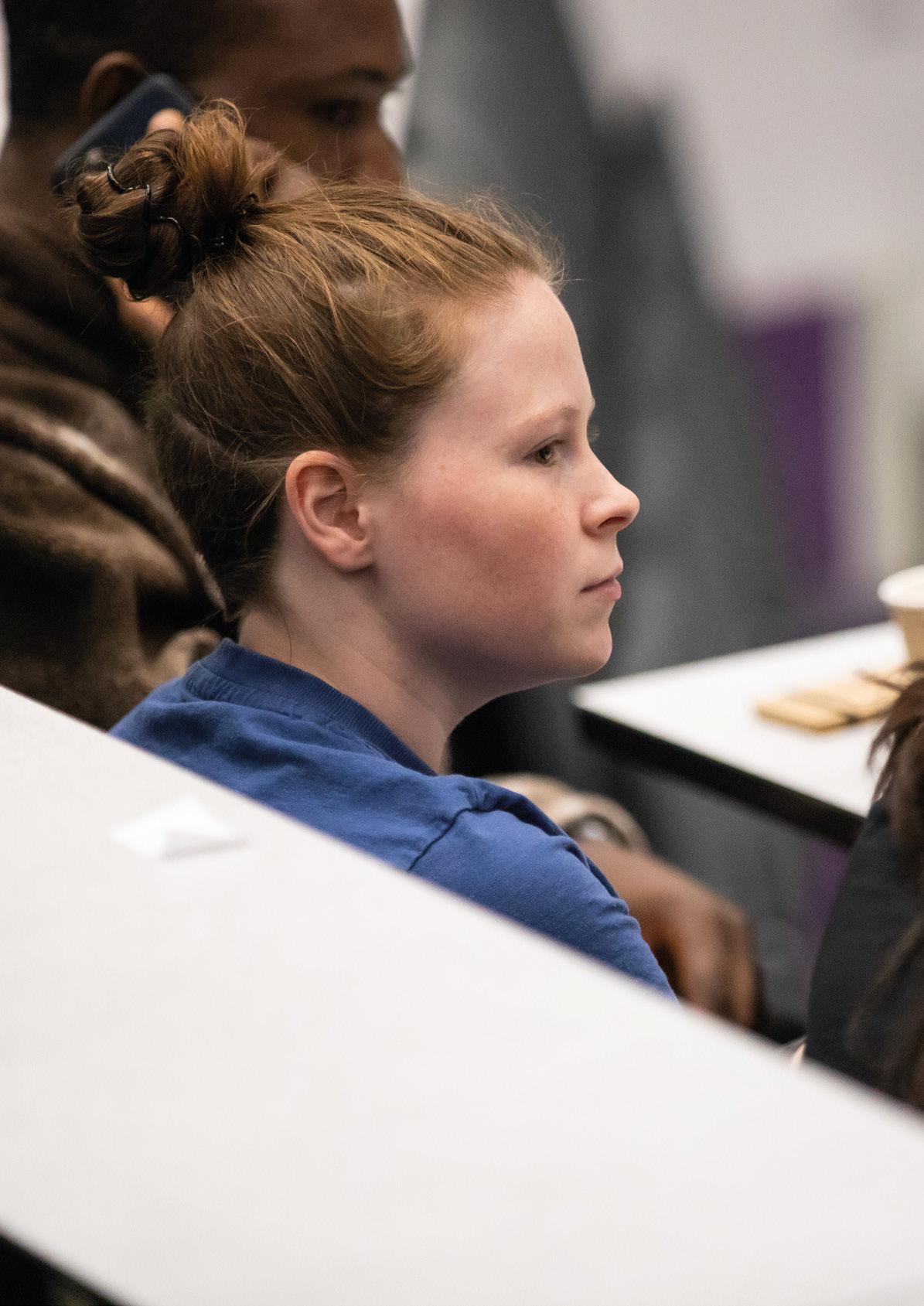
Through our Innovation Strategy and investments we are creating a hub of research excellence at the heart of Greater Manchester - one of the fastest growing city-regions in Europe. We are investing in new people, facilities and buildings that will drive forward our research and deepen our partnerships. Examples of how we are investing for the future are mapped against our Innovation Strategy priorities below:
Capital investment allowed us to open two new research buildings in 2023. Energy House 2.0 and NERIC both showcase our commitment to continually expanding areas of excellence, and add value to the University, the city and wider region’s technical infrastructure. In the next 3-5 years we plan to build a world-leading acoustics building, expanding the research and commercial offering of our Acoustics Research Centre.
We are investing in our research staff to increase both numbers and research quality. Our new University Fellowship programme recruited 21 new Research Fellows in 2023. This first cohort of Fellows bring outstanding track records of research, innovation and impact, along with global reach. Once embedded we will be looking to recruit further cohorts of Fellows to the programme in the future.
Our people are at the heart of our research culture. We are committed to creating a truly inclusive research culture, where all of our researchers are supported to maximise their potential and career development. As a starting point, we are introducing widening participation scholarships for postgraduate researchers. From 2023 we will fund 10 new postgraduate researchers per year on 3.5 year scholarships as part of our training of the next generation of researchers.
We are an active player in Innovation Greater Manchester, a key pillar of the city-region’s economic vision to deliver a fairer, greener and more productive economy. One of the ways we are contributing is through development of the Innovation District, within our Campus Masterplan. Alongside our new research buildings, this will be home to the new Greater Manchester Institute of Technology, providing a holistic meeting point of research innovation and the future workforce. This will provide us with new ways to engage our long-standing partners, such as Siemens, Talk Talk and GCHQ, and to develop and attract new partners.
We are creating a new Clinical Building which will include NHS-standard clinical facilities. It will offer increased public access to healthcare through greater numbers of clinical spaces and services. Narrowing the gap between research and the clinic, this new facility will allow patients to receive the most up-to-date and advanced treatments, through access to world-leading researchers in areas such as rehabilitation.
Over the next 5-10 years our partnerships will be strengthened and our networks grown through these investments. We will play our part in building a more innovative country, generating opportunities and driving prosperity for all.
Come follow us on our journey.